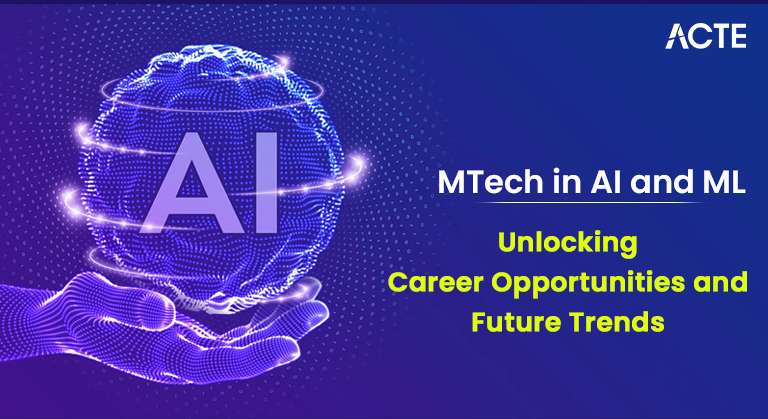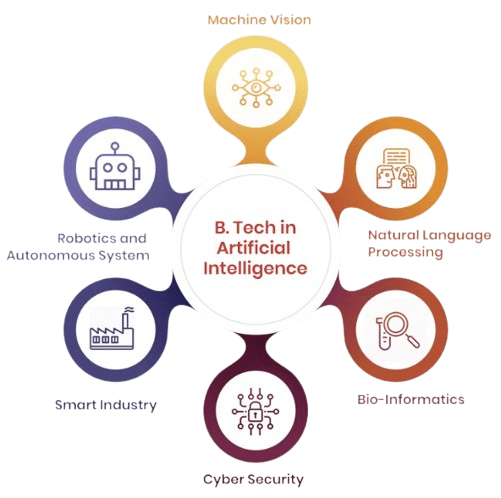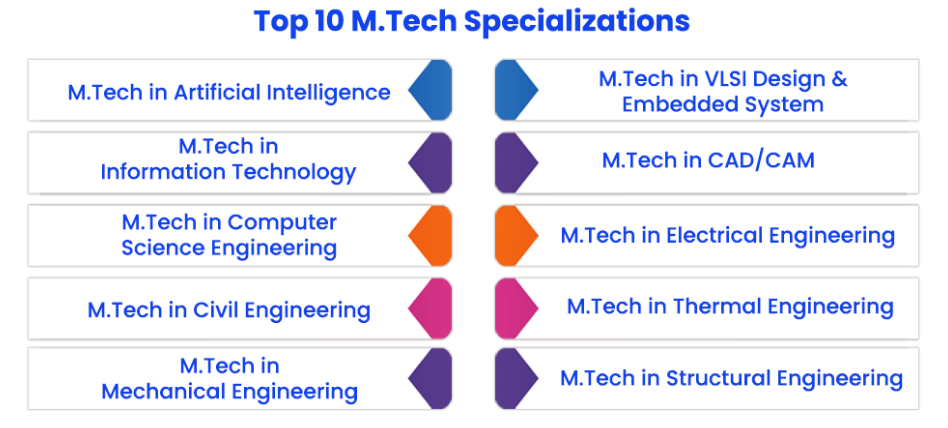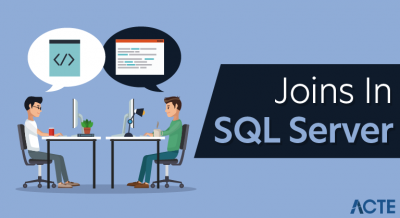
- Introduction to MTech in AI and ML
- Eligibility Criteria for MTech AI/ML Programs
- Curriculum Overview: Core Subjects and Electives
- Career Opportunities After MTech in AI/ML
- Industries Hiring MTech AI/ML Graduates
- Skills Required for MTech in AI/ML
- Future Trends in AI and ML Education
- How to Prepare for an MTech AI/ML Admission
Introduction to MTech in AI and ML
The Master of Technology (MTech) in Artificial Intelligence (AI) and Machine Learning (ML) is a specialized postgraduate program designed to equip students with the advanced skills and knowledge required to excel in the rapidly evolving fields of AI and ML. As AI and ML technologies revolutionize industries globally, the demand for skilled professionals in these domains is skyrocketing. This program provides a strong foundation in the theoretical aspects of AI/ML and practical skills in programming, data analysis, and algorithm development through comprehensive Data Science Training, preparing graduates for high-demand roles in research, development, and innovation. The program typically lasts two years and combines coursework and research projects. It is ideal for individuals with a strong computer science, mathematics, and engineering background who want to delve deeper into the world of intelligent systems and data-driven technologies.
Interested in Obtaining Your Data Science Certificate? View The Data Science Course Training Offered By ACTE Right Now!
Eligibility Criteria for MTech AI/ML Programs
Educational Qualifications:
- A Bachelor’s degree (BTech, BE, or equivalent) in computer science, information technology, electronics, electrical engineering, or a related field is typically required.
- A minimum aggregate score, often 60% or above, in the undergraduate degree, is also a common requirement.
Entrance Exams:
- Many universities require candidates to qualify for an entrance exam to be eligible for admission.
- The most popular entrance exams for MTech in AI/ML programs include GATE in India, GRE for international students, and candidates are often expected to have basic technical skills, such as understanding Locking and Unlocking Cells in Excel for handling data securely.
- The entrance exams generally assess candidates’ knowledge in subjects like mathematics, computer science, and engineering fundamentals.
Subject Prerequisites:
- Some programs may require candidates to have prior coursework or experience in programming, algorithms, data structures, linear algebra, probability, and statistics.
- Letters of recommendation (LORs) from professors or employers.
- A statement of purpose (SOP) outlining the candidate’s interest in AI/ML.
- Interview performance (if applicable in some universities).
- Introduction to AI: Basic concepts, history, and applications of AI, including problem-solving techniques, search algorithms, and knowledge representation.
- Machine Learning Algorithms: Supervised and unsupervised learning, deep learning, reinforcement learning, clustering, classification, and regression.
- Mathematics for AI: Linear algebra, calculus, probability theory, and statistics used in AI and ML modeling.
- Data Structures and Algorithms: The foundation for efficient algorithm design and implementation, particularly in AI/ML tasks, is strengthened through comprehensive Data Science Training.
- Artificial Neural Networks (ANN): Understanding the architecture, learning techniques, and applications of neural networks.
- Natural Language Processing (NLP): Techniques for processing and analyzing human language data.
- Computer Vision: Algorithms for image processing, pattern recognition, and object detection.
- AI Ethics and Societal Impact: A focus on ethical considerations in AI, data privacy, and the societal implications of AI technologies.
- Reinforcement Learning: Algorithms that allow machines to learn through trial and error.
- Robotics and Autonomous Systems: Applications of AI and ML in robotic systems.
- Big Data Analytics: Techniques for processing and analyzing large datasets.
- Blockchain and AI: The intersection of blockchain technology with AI.
- AI in Healthcare: Applications of AI in medical diagnostics, drug discovery, and personalized healthcare.
- Technology: Companies like Google, Amazon, Microsoft, and Facebook heavily recruit AI/ML experts for their R&D departments.
- Finance: AI/ML applications in fraud detection, algorithmic trading, and customer insights are widely used in finance.
- Healthcare: AI/ML is used in diagnostic systems, personalized medicine, and drug discovery, where efficient data retrieval techniques like using an Index in SQL play a crucial role in handling large medical databases.
- Automotive: Self-driving technology and robotics are central to the automotive industry, making AI/ML skills highly sought after.
- Retail: AI/ML is crucial in personalized recommendations, supply chain management, and predictive analytics.
- Telecommunications: Companies in this industry use AI/ML for network optimization, customer service automation, and predictive maintenance.
- Manufacturing: AI/ML is used in quality control, automation, and smart manufacturing.
- Programming Languages: Proficiency in languages like Python, R, Java, and C++ is essential for implementing AI/ML algorithms.
- Mathematics and Statistics: A strong understanding of linear algebra, calculus, probability, and statistics is critical for developing AI models, and tools like the Round Off Formula in Excel can assist in managing and presenting numerical data accurately during the modeling process.
- Data Handling and Processing: Skills in data wrangling, data cleaning, and using tools like Pandas, NumPy, and SQL.
- Machine Learning Frameworks: Familiarity with ML frameworks such as TensorFlow, Keras, PyTorch, and Scikit-learn.
- Problem-Solving: The ability to break down complex problems and design algorithms to solve them.
- Research and Analytical Skills: Conduct research, analyze results, and publish findings.

Other Requirements:
Curriculum Overview: Core Subjects and Electives
Core Subjects:
Elective Subjects:
To Earn Your Data Science Certification, Gain Insights From Leading Data Science Experts And Advance Your Career With ACTE’s Data Science Course Training Today!
Career Opportunities After MTech in AI/ML
After completing an MTech in Artificial Intelligence (AI) and Machine Learning (ML), there are numerous career opportunities across various industries, thanks to the growing demand for AI-driven solutions. Graduates can pursue roles such as AI/ML Engineer, where they develop and deploy algorithms for tasks like predictive modeling, computer vision, and natural language processing, often utilizing Data Extraction Tools to gather and preprocess large datasets. Data Scientist is another popular career path, involving the analysis of large datasets to extract actionable insights using statistical models and machine learning techniques. For those interested in research, roles in AI Research or Machine Learning Research offer opportunities to contribute to cutting-edge advancements in the field.

Additionally, positions like Data Analyst or Business Intelligence Analyst leverage AI and ML tools to help organizations make data-driven decisions. The tech industry is not the only place for AI/ML professionals. AI Specialists are also in demand in healthcare, finance, retail, and even government sectors. With an MTech in AI/ML, graduates can explore a broad range of roles that shape the future of technology and innovation.
Industries Hiring MTech AI/ML Graduates
Looking to Master Data Science? Discover the Data Science Masters Course Available at ACTE Now!
Skills Required for MTech in AI/ML
To excel in an MTech program in AI and ML, students should have a solid foundation in the following skills:
Future Trends in AI and ML Education
The future of AI and ML education is rapidly evolving to keep pace with the increasing demand for advanced technological skills and the growing capabilities of AI itself. One key trend is the rise of online learning platforms and micro-credentials, which allow individuals to acquire specialized knowledge in AI and ML through flexible, accessible, and affordable means. Institutions are also integrating project-based learning and real-world applications into their curricula, ensuring students gain hands-on experience by working on industry-driven challenges and datasets. Additionally, interdisciplinary education is becoming more prominent, as AI and ML are applied in various fields such as healthcare, finance, agriculture, and more, often requiring knowledge of data operations like SQL INTERSECT to combine and analyze datasets effectively. This encourages students to combine AI skills with domain-specific knowledge, creating professionals who can address unique problems across sectors. AI ethics and responsible AI are increasingly being incorporated into educational programs, reflecting the growing importance of ethical considerations in AI development. Lastly, AI-powered tools for personalized learning and adaptive curricula are improving the educational experience, allowing students to learn at their own pace and receive tailored recommendations for their progress. These trends suggest that AI and ML education will continue to be more dynamic, inclusive, and integrated with the needs of a rapidly advancing field.
Want to Learn About Data Science? Explore Our Data Science Interview Questions & Answer Featuring the Most Frequently Asked Questions in Job Interviews.
How to Prepare for an MTech AI/ML Admission
Preparing for MTech in AI/ML admission requires a focused approach that combines academic readiness, technical skills, and practical experience. Start by ensuring you have a solid foundation in key subjects like Mathematics (Linear Algebra, Calculus, Probability, and Statistics), Computer Science (Data Structures, Algorithms, and Programming Languages such as Python, Java, or C++). A strong understanding of these fundamentals, enhanced through Data Science Training, is essential for grasping the complex AI/ML concepts. Additionally, familiarize yourself with core AI/ML algorithms and techniques, including Machine Learning, Deep Learning, and Natural Language Processing. Hands-on experience is crucial, so work on projects that demonstrate your ability to apply theoretical knowledge to real-world problems and use platforms like Kaggle and GitHub to showcase your work. If required, prepare thoroughly for entrance exams like GATE (Graduate Aptitude Test in Engineering), focusing on related subjects. Research the specific MTech programs you’re applying to, ensuring your application reflects how your background and interests align with their offerings. A well-rounded application, combined with solid technical knowledge and hands-on experience, will help strengthen your candidacy.



